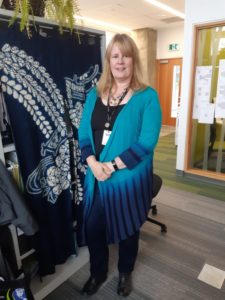Know Your Profs is an ongoing series of profiles on the instructors at Camosun College. Every issue we ask a different instructor at Camosun the same 10 questions in an attempt to get to know them a little better.
Do you have an instructor that you want to see interviewed in the paper? Maybe you want to know more about one of your teachers, but you’re too busy, or you’re too shy, to ask? Email editor@nexusnewspaper.com and we’ll add your instructor to our list of teachers to talk to.
This issue we talked to Mental Health and Addictions instructor Kristin Ross about faulty technology, Japanese food, and the impact that a struggling student who makes it can have.

1. What do you teach and how long have you been at Camosun?
I’ve enjoyed being at Camosun for over 15 years, since moving from Lethbridge College, where I taught in the Child and Youth Care diploma. I currently teach in the Mental Health and Addictions programs (certificate and post-graduate diploma). I am looking forward to being a part of the new Mental Health and Criminal Justice advanced certificate starting in September 2020.
2. What do you personally get out of teaching?
There are so many rewards in teaching, yet one that stands out is being involved in programs that help students develop skills and knowledge to support others. It’s inspiring to hear from graduates who are in a variety of roles and are making a difference for individuals and are building communities. It really connects to my sense of purpose.
3. What’s one thing you wish your students knew about you?
I don’t share about my dedication to teaching and that I spend quite a bit of time planning the classroom experience. Everything is intentional and tied to learning outcomes, but it’s not always apparent, and students may be left wondering, “Why am I learning this?” That connects to another reward of teaching—hearing a graduate share, “Now I get why we learned that!”
4. What is one thing you wish they didn’t know about you?
Hmmm, I can’t think of anything, since I tend to be quite open. It might be good if I shared even more of my missteps over the years as examples of “learning through blunders”; I’ve had a lot of those experiences!
5. What’s the best thing that’s ever happened to you as a teacher here?
When students return to the program after taking time to be in a healthier place. I recall one student in particular who was facing multiple challenges in his life, yet he persevered and excelled in the courses when he returned. He is doing amazing things in the community now.
6. What’s the worst thing that’s ever happened to you as a teacher here?
There really hasn’t been anything significant, although something did happen recently. Everyone knows I like to be organized, and part of that includes setting calendar alerts for myself. I was in my new office area when I happened to look up at the clock and saw I was late for class! I had failed to hear the 15-minute reminder because the computer setup did not include speakers. Needless to say, I now have a new system in place.
7. What do you see in the future of post-secondary education?
I believe we will see more opportunities to help students engage in project-based learning to meet multiple learning outcomes and better reflect the work they will do in their careers. This will involve team-building and critical-thinking skills, much needed in all areas of Health and Human Services.
8. What do you do to relax on the weekends?
I really enjoy time with my nieces and nephews, reading and nature walks with the younger ones, or watching the older ones play league volleyball and soccer.
9. What’s your favourite meal?
Definitely anything Japanese. I’ve been to Japan a few times and appreciate how they highlight different local foods in each region, plus the way the seasons are celebrated through food. For the most part, it’s very healthy.
10. What is your biggest pet peeve?
I’ve shared this one with students: When someone can’t make it to a class and asks, “Will/did I miss anything important?” I like to think everything is important.
